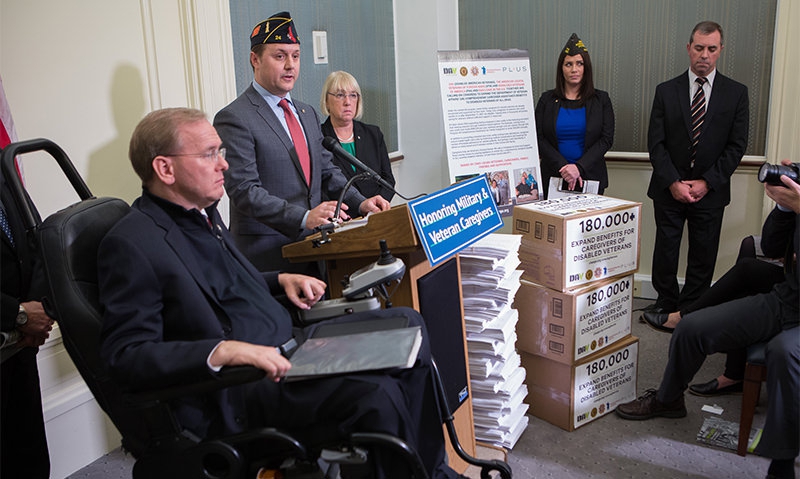
Legion urges passage of S. 2193
On Dec. 7, The American Legion and several other veterans service organizations sent a letter to U.S. Senate leadership, urging passage of S. 2193, the Caring for Our Veterans Act of 2017. The legislation would build on current community care programs by putting an end to arbitrary standards for when veterans may receive community care and by consolidating the disparate community care programs into one program. The intention is to remove confusion over when and how veterans can access community care doctors, and ensure VA remains the coordinator of care for veterans regardless if care is delivered at VA medical facilities or through community care providers.
The letter comes on the heels of The American Legion, and other VSO representatives and members of Congress joining together Dec. 6 for a Capitol Hill press conference to urge Congress to pass a bill expanding caregiver benefits to veterans injured before 9/11. The group presented Congress with more than 180,000 petitions calling for expansion of the benefits.
The full text of the Dec. 7 letter follows.
Dear Majority Leader McConnell and Minority Leader Schumer:
On behalf of the millions of veterans we represent, and all veterans who use the Department of Veterans Affairs (VA) health care system, we write to urge you to take whatever actions are necessary to swiftly bring to the floor and pass S. 2193, the Caring for Our Veterans Act of 2017, bipartisan legislation approved by the Committee on Veterans’ Affairs last week to improve and modernize the care America provides her veterans.
The brave men and women who have worn our nation’s uniform must have timely access to high-quality, comprehensive and veteran-centric care. The majority of our members rely on VA to provide such care, but understand that VA must turn to private sector partners when it is not able to reasonably meet the demand for care in its health system. This legislation would build on current community care programs by putting an end to arbitrary standards for when veterans may receive community care and by consolidating the disparate community care programs into one program. In doing so, this legislation would remove confusion over when and how veterans can access community care doctors, and ensure VA remains the coordinator of care for veterans regardless if care is delivered at VA medical facilities or through community care providers.
We are pleased this legislation would empower veterans and their health care providers to work together to determine when and where veterans should receive care based on access and quality measures. This approach is also very similar to VA’s Veterans Coordinated Access and Rewarding Experiences (CARE) plan, which was developed with direct input from major veterans service organizations. The bill would ensure certain community care doctors are trained to provide veteran-centric care that abides by VA’s best practices and clinical practice guidelines. Importantly, this legislation would ensure VA does not rush implementation of the new and improved community care program by funding the current Choice Program through the end of fiscal year 2018. It also consolidates future community care funding within one discretionary appropriations account to end the current dual-funding process which has led to numerous community care funding shortfalls and veterans being denied access to community care.
The legislation would also give veterans the opportunity to access walk-in clinics throughout the country to fill the gap between costly emergency room care and waiting for ambulatory care. However, it does not protect a covered veteran from paying out-of-pocket fees for service-connected illnesses and injuries. We call on Congress to make certain veterans are not charged copayments for illnesses and injuries related to their military service.
Additionally, this legislation includes important provisions to strengthen the VA health care system and expand its ability to provide direct care to our nation’s veterans, while preserving VA foundational services not accommodated in the private sector. It would expand and improve VA’s graduate medical education, loan repayment and residency programs to ensure VA is able to recruit and retain high-quality health care professionals. It also includes much-needed supplemental appropriations to expand and improve VA’s capital infrastructure and authorizes VA health care professionals to practice telemedicine across state lines to ensure veterans, particularly those in rural settings, have convenient access to virtual health care.
Finally, we strongly support Title III of the legislation which would extend VA’s comprehensive caregiver benefits to veterans of all eras. The legislation would finally correct a serious inequity between veterans who served before September 11, 2001 and their post-9/11 comrades, who believe the caregivers of pre-9/11 veterans must have access to comprehensive caregiver services that are fully funded and properly managed. As this legislation moves through the Senate and into conference discussions with the House, we urge you to ensure this critical caregiver equity provision remains part of the final legislation.
We ask that you work together to secure Senate passage of the Caring for Our Veterans Act of 2017 before the end of the year so the House and Senate Committees on Veterans’ Affairs are given enough time to reach a final agreement before funding for the Choice Program is depleted again. Failure to do so would deprive veterans access to the high-quality care they have earned and deserve. We look forward to working with you and all members of the Senate to ensure swift passage of this important, bipartisan and comprehensive legislation.
